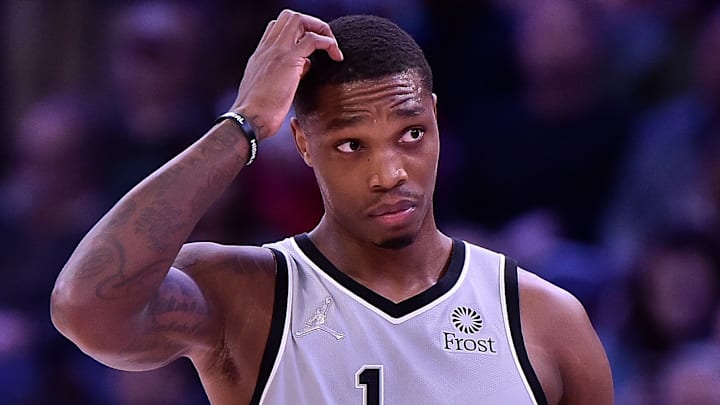San Antonio Spurs guard Lonnie Walker entered this season with plenty of incentive to play well, but he largely underperformed despite it being a contract year. In fact, I predicted that his next contract would be worth just $21 million over 3 years. However, based on his play post-All-Star break, that's likely changed.
Walker has been much more assertive, played with more consistency, and shot much better-- pretty much the exact opposite of how he played before. Hopefully, this means he's turned a corner. That could help the Spurs but also cost them. With that being said, let's reassess Walker's restricted free agency in light of his recent play.
In the second half of the season, he's averaging a terrific 15.8 points on 57.2% true shooting in 13 games, up from the 11.2 points he averaged during the first half of the year on 49.3% true shooting.
While most of Walker's offensive struggles this season can be attributed to his overreliance on his jumper, ironically, his drastic increase in efficiency is a result of him shooting more threes on a higher percentage.
He's connecting on 37.5% of his 6.3 threes per game during this hot stretch, up from the 4.7 he averaged before, which is both encouraging and somewhat concerning. Walker hit just 29.4% of his threes pre-All-Star break but he isn't nearly as bad of a shooter as that would suggest. Still, it's hard to say whether he's an above-average 3-point shooter, especially on a high volume. Instead, he's somewhere in the middle, but his recent sharpshooting has essentially been an improvement toward the mean.
In addition to bombing away from three, Walker has also been noticeably more aggressive in attacking the basket. Previously, he would either settle for jumpers, drive and kick, or struggle to finish through contact.
Now, he's relentlessly attacking openings and utilizing his speed to blow past late rotating defenders, using his elite athleticism to finish at the rim with acrobatic layups or huge dunks. That's a welcome change in approach and is something that is likely more sustainable than his shooting going forward.

How much will Lonnie Walker's next contract be worth?
Walker's drastically improved play has almost certainly helped his case in restricted free agency. Despite that, restricted free agency can be difficult for non-stars, given that teams presumably aren't willing to overpay for them. Additionally, they may not be willing to tie up cap space for several days during free agency while they wait to see if the player's team will match the offer.
That may still be the case for Walker, but it only takes one team to look at what he's done over an extended period and think that he could do that in their uniform. Could someone offer a 3-year, $30 million deal? Possibly. And that would force San Antonio to decide whether to match. The better question is whether he's worth at least $10 million a year.
The odds are he'll come back down to earth, especially his shooting, considering he takes a lot of shots off the dribble. On the other hand, he has shot the ball poorly from the free-throw line during this stretch, hitting just 68% of his attempts, but providing an obvious area for improvement. Also, his decisive drives should mean that he'll keep getting high percentage shots instead of settling for jumpers.
As a result, he could probably average 16 points per game over an entire season while coming off the bench. That's definitely worth $10 million per season. Maybe even more, actually, but restricted free agency might suppress his value. For comparison, reigning Sixth Man of the Year Jordan Clarkson makes an average of $12.5 million per season and is averaging 16.1 points per game. Walker presumably won't receive an offer for more than what Clarkson makes, but his second-half offensive production isn't far off, so his salary may not be either.
Ultimately, Walker has played well enough to increase his value in restricted free agency while also looking like he could play a key role on the team going forward. Just a couple of months ago, it didn't seem like either was possible, but now it could cost the Spurs more to retain him. That's fine, and the Spurs wouldn't be in any position to lose him unless they're unwilling to pay Walker.
I don't see that happening at this point, especially with the considerable amount of cap space the Spurs have and the lack of free agent options. In fact, this version of Walker is probably better than almost any free agent they could reasonably get. Thus, bringing Walker back on a 3-year, $30 million deal still makes the most sense, particularly if he continues to play at this level.
